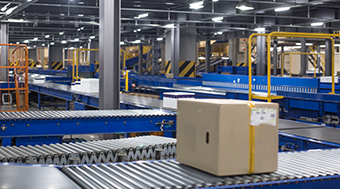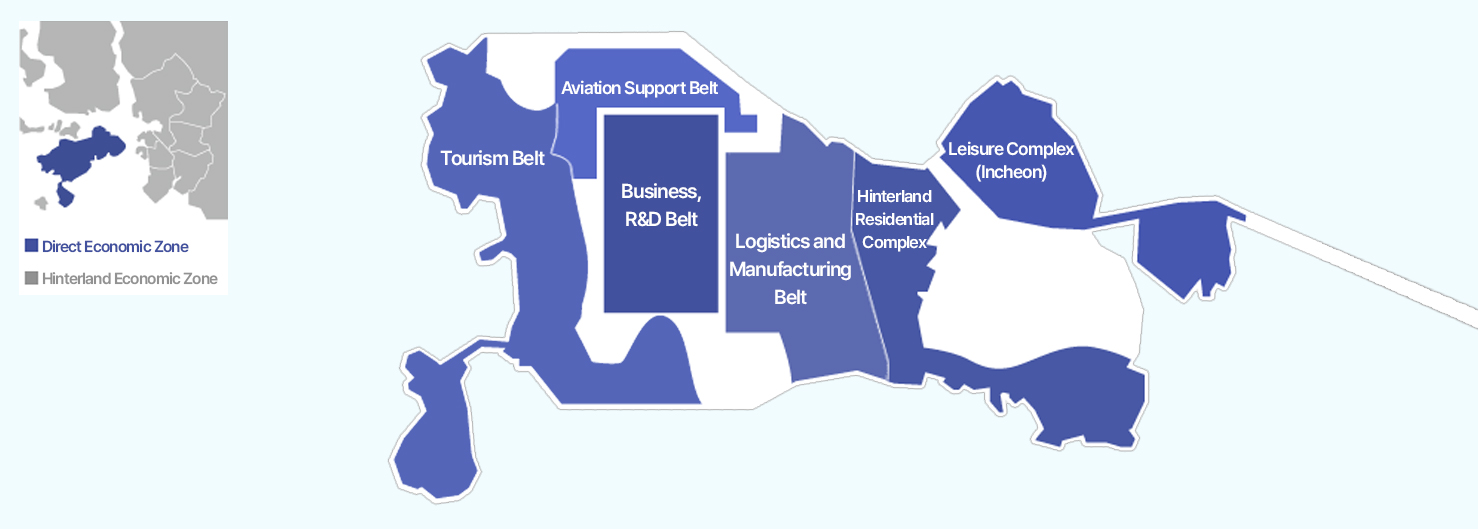Overview of the Airport Economic Zone
A vast economic area where various airport-related industries converge, creating an industrial ecosystem where diverse economic activities and values are generated through an extensive aviation network.
Evolution of the Airport Paradigm
| First Generation | Second Generation | Third Generation |
|---|---|---|
| Construction of infrastructure for aircraft takeoffs and landings, with convenience and commercial facilities within the passenger terminal | A multicultural space (Airport City) combining transportation, shopping, and business along with leisure and entertainment functions | A hub for economic activities expanded to include industrial bases and hinterland areas based on global accessibility |
Incheon Airport Economic Zone
The Incheon Airport Economic Zone is positioning itself as a global business platform, realizing excellent synergy with the technologically advanced metropolitan region.
- Regulatory Free Zone
- GDC, Fulfillment Center
- Visa-Free Entry, English as an Official Language
- Top-Level Stage in Each Industrial Sector
- Serving as the anchor for the entire airport economic zone through industrial attraction
- Advanced Assembly and Processing
- GDC
- International Conferences
- Integrated Resorts
- MRO
- General Administrative District
- Regulatory Relaxation
- Focus on industries in the hinterland linked to the direct economic zone
- Supply of basic components and development of materials, etc.
- Manufacturing related to aviation exports and basic components
- Establishing a foundation for hinterland industries such as education, research, and development in the direct economic zone
- Tourism in Nearby Cities
- Component Materials
- Product Supply
- Workforce Supply
Four Key Strategies of the Airport Economic Zone
Incheon Airport is advancing as a global business hub and shaping the future through its airport economic zone.
-
 Business/R&D Hub
Business/R&D Hub
As a vast business platform, Incheon Airport provides a diverse business environment including global aviation town, R&D and training complexes, and aircraft finance support zones.
-
 Tourism/Logistics Hub
Tourism/Logistics Hub
Development of iconic landmarks and creation of a tourism industry belt, along with advanced industry hubs like GDC and fulfillment centers in response to changes in e-commerce and distribution processes.
-
 Advanced Industry Hub
Advanced Industry Hub
Serving as an industrial complex that leads global manufacturing innovation through the creation of a convergence industry hub centered on the Fourth Industrial Revolution.
-
 Aviation Support Hub
Aviation Support Hub
Development of state-of-the-art MRO complex and FBO facilities as part of a mid- to long-term strategy that comprehensively considers changes in the industrial environment
Expected Impact
Incheon Airport is expected to generate beneficial ripple effects not only in airport-related business but also in the regional and national economy, contributing to public value.
Projected Ripple Effects by Sector for 2030
| Category | Annual Revenue | Production Inducement Effect |
|---|---|---|
| Logistics | KRW 900 billion | KRW 1.7 trillion |
| MRO | KRW 2.4 trillion | KRW 3.7 trillion |
| Tourism | KRW 5.8 trillion | KRW 9.9 trillion |
| Total | KRW 9.1 trillion | KRW 15.3 trillion |
- Strengthening Networks
- Building an Economic Zone
- Creating Inbound Demand
Fostering a Competitive Airport-Centered City and Industry through a Virtuous-Cycle Structure
- Telephone : +82-32-741-3751, 3752
- Managing department : Economic Zone Planning Team


